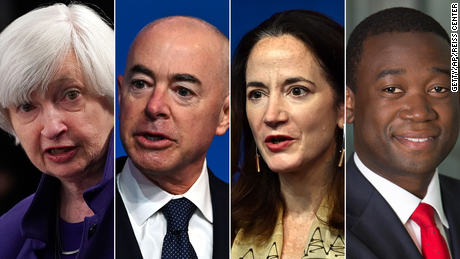The President-elect made clear he intends to take a swing at fundamentally changing the economy. This is the team that will try.
Biden has made clear in his comments on the campaign trail, since he was elected, and in the make-up of his team, that he intends to take a swing at fundamentally reordering the economy in favor of working men and women — a goal that shows huge ambition but comes with dubious chances of success.
“This team is comprised of respected and tested groundbreaking public servants who will help the communities hardest hit by Covid-19 and address the structural inequities in our economy,” Biden said, summing up his dual mission in a press release on Monday.
Even before the pandemic, inequalities and blocked social mobility, especially in the post-industrial heartlands of the Midwest and among blue-collar workers, was a defining feature of the politics of the early 21st century.
In the long term, Biden’s team, after two presidencies in which inequality has expanded despite massive economic expansion that has benefited the stocks-owning classes, must prove that vows to lift up the middle class are actually realistic in a globalized world and are more than just slogans flung out by nostalgic politicians on the campaign trail.
Forging social change
The credentials of many of Biden’s new team leave little doubt that the former vice president plans to keep his promises to America’s workers and to repay the faith of labor unions that have long backed his political campaigns.
Yellen started her professional life as a labor economist and has a reputation for seeking to shield the most vulnerable from the worst economic shocks. Cecilia Rouse, Biden’s pick to chair the Council of Economic Advisers, is also a labor economist and has said she turned to the discipline to forge social change.
“To fix what is broken and rebuild stronger than before, we need a new social contract for the 21st Century, one that updates the New Deal,” Tanden wrote. “It is high time to rethink the relationship — the basic bargain — between the individual, companies, and our government.”
The most immediate test facing Biden’s team is an already dire economic situation that will likely be far worse when he takes office on January 20 as the pandemic rages in a fall and winter spike. Its resurgence, closing many restaurants and businesses that had struggled to revive over the summer, likely means the economy will struggle to grow and unemployment will rise during the first quarter.
Biden is in a similar position to newly elected Franklin Roosevelt when he waited months (the inauguration was in March in those days) in 1932-33 to tackle the Great Depression as his predecessor President Herbert Hoover — like Trump in the deepening Covid-crisis — was overwhelmed by the disaster unfolding on his watch. But unlike FDR, there is no expectation Biden will manage to pass nation-changing legislation to end the economic storm.
At best — if Democrats can somehow win two run-off elections in Georgia in January — Biden would have a 50-50 Senate with Vice President-elect Kamala Harris to throw tied votes his way. A Senate led by the Republican master of inertia, Sen. Mitch McConnell, is the more likely outcome, which would make a large stimulus package more difficult to achieve. There are already signs that the GOP is rediscovering its zeal for budget discipline, after four years of indulging Trump policies that exploded the deficit, which normally happens during downturns, at a time of economic growth.
Even a small short-term measure could help millions of Americans hurt by the ebbing of government support from previous stimulus packages that kept small businesses afloat, kept renters in their homes and provided extended unemployment benefits.
‘Half a loaf’ is better than none
The Democratic House and the Republican Senate have for weeks been unable to agree on the size or make-up of a new Covid-19 relief support package. Trump’s absent leadership hasn’t helped.
The need is so acute that some Democrats have begun to tiptoe toward unusual criticism of House Speaker Nancy Pelosi, who argues that Republican proposals do not provide the level or duration of support Americans need.
Austan Goolsbee, a senior economic adviser in the Obama administration, told CNN’s Manu Raju on Sunday that “the virus really is the boss of the economy” and that there is a risk of a double dip recession.
“If they have to accept half a loaf, then they should accept half a loaf. And then let’s try to get another half of a loaf. But right now is really touch and go, and I wish both sides could see that,” he said.
McConnell said on Monday that it was still possible that an economic agreement could happen in the final days of the old Congress — though his remarks also could be interpreted as yet more posturing.
“Let’s hope our colleagues at the top of the Democratic Party can finally hear their own members and stop blocking the common sense, multi-hundred-billion-dollar measures that Republicans have been ready to deliver for months,” the Kentucky Republican said.
Biden has a history of sealing deals with McConnell and he will take office with the power that attaches to a newly inaugurated president.
He will be seeking not just short-term help for the unemployed and shuttered businesses but massive funding for states neglected by the Trump White House. He has ambitious plans for a new test-and-trace system to slow infections. States are asking for millions of dollars to stand up vaccination programs. And by the time that Biden takes the oath of office, many American kids will have been out of school for 10 months — with education officials still lacking federal help to make their eventual return to class safe.
Still, Biden will have the advantage of being able to argue to Congress that a new economic package — while desperately needed — will be a bridge to better times that are in the near future, thanks to the highly encouraging news about the effectiveness of vaccines developed under the Trump administration.
A more hopeful future
That’s when the second, more complicated part of the economic team’s job will begin: an attempt to reshape an economy that every President in modern memory has argued is biased against the less well-off but none has managed to rebalance. Given the extreme short-term and long-term impediments to his program and difficult political conditions, Biden probably couldn’t have chosen a better candidate than Yellen, who, if confirmed by the Senate, will be the first female treasury secretary.
The former Federal Reserve chair is respected on both sides of Capitol Hill, a quality that will be important in forging a new stimulus deal. Her knowledge of and good relations with the Fed will also be useful in maximizing the one-two punch the Treasury and central bank could use to kick start the economy.
Yellen’s nomination has also been welcomed by some progressives — an important consideration in keeping the fractious ideological groups in the Democratic Party together.
![]()








